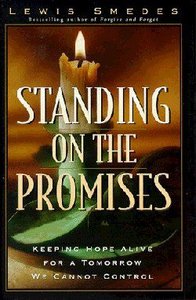Lewis Smedes: Standing on the Promises
 Lewis Smedes, Standing on the Promises (Thomas Nelson, 1998), 196 pages, ISBN 9780785270089.
Lewis Smedes, Standing on the Promises (Thomas Nelson, 1998), 196 pages, ISBN 9780785270089.
I have liked Lewis Smedes for the past 15 years or so. I only know him through his books but that’s enough for me. The first Smedes’ book I read way back those years ago was on forgiving and through that book I forgave a man who I thought had violated me in the business world. I found that by adopting and following what Smedes wrote about forgiving permitted me to become the head and no longer the tail, a delightful turn of events I assure you.
With that experience in mind, I have continued to read much of what Smedes has written over the intervening years and when I saw Standing on the Promises in the Fuller Seminary bookstore, I took one home. Smedes has the ability to say a great deal in a few words so his books are not overwhelming in their size.
I soon found myself thinking about Hope in ways that I had never thought to think until Smedes led me there. His treatise is presented in three points with each point divided into ten short subsets, each with a point of its own.
His entry view of hope prescribed the elements of hope and what was needed for hope to exist. We need life for hope and hope for life. From there he teaches how to prioritize our hopes and finally how to see the hand of God in making our hopes reality or closing the door on what was never to be. As an example of this closure, our daughter lost her husband to cancer early this year. We had all prayed and hoped for five years that he would conquer this terrible disease. He did not and that hope is gone.
As I worked my way through the book I thought of my own hopes, intimate personal things like hoping that my 20 year long obligation to pay alimony to my former wife would end, that my 21 year old grandson would be saved and that I could find a publisher in the religious marketplace. I have other hopes too—I would like to have several million dollars at my disposal and I hope that happens soon—but not all of my hopes have the same intensity.
Smedes shares his hopes as the book winds its way to its end. He is ten years older than I and his hopes relate to his health and that of his wife. His hopes are grander and much more noble than mine. He hopes for a world that rises above the behavior and strife that ours faces each day. I enjoyed the hope he expressed for the future of our world.
Category: Living the Faith, Winter 2000


